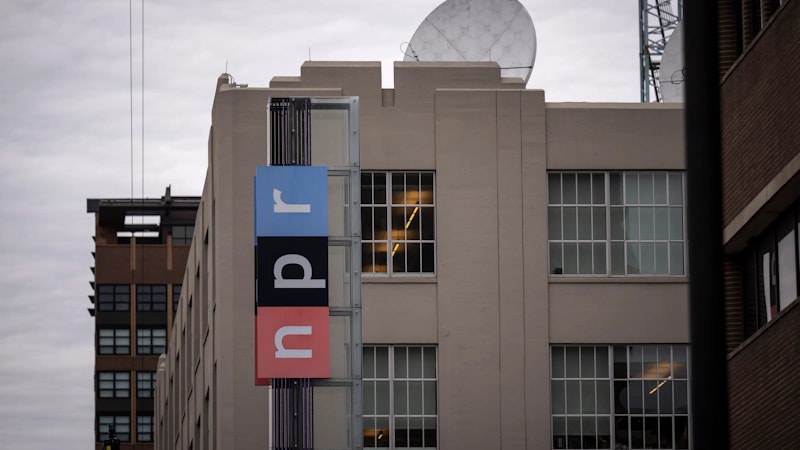As a mere NPR day-tripper—meaning I catch snatches of its near-parody left-wing material when I’m in the car with my wife—I’m agnostic over the current controversy that began when Uri Berliner, a 25-year veteran of the network, wrote a critical essay for the hit-or-miss website, The Free Press, whose public face is Bari Weiss, a disaffected New York Times employee. Berliner’s detractors are likely correct: the fellow had enough and wanted to cause a stir on his way out. So what? Happens at some media outlet at least once a month.
There are so many vituperative conservative social media critics insisting that NPR must be “defunded,” as if that’s a new idea. (NPR’s defenders are equally laughable.) The exact amount of taxpayer money that the feds and state governments fork over to NPR is murky—big surprise—but it’s not a majority of its budget. I disagree with any public funding, simply because it’s creepy for the government to have leverage over a news outlet, but considering far larger boondoggles in Washington, D.C., from both Democrats and Republicans—Amtrak, the doddering USPS—I don’t lose any sleep over it, and definitely won’t make it a “hill to die on.” An imperfect, but relevant analogy is wealthy sports franchise owners, every single year, attempting to secure public funds for stadium improvements. I don’t blame the owners—it’s business, and you take what you can get—but local elected officials who give in to their demands are screwing their constituents.
My radio history started as a boy in the 1960s and wasn’t uncommon. During inclement weather on Long Island, I tuned into local WGSM to see if school was called off, clutching figurative rosary beads along with my brothers. I always listened to WMCA (“the Good Guys) and WABC (couldn’t stand Cousin Brucie) on the AM dial to hear the great pop hits that accelerated with the British Invasion, whether on clock radio, transistor or in the car. (I remember one day in May of 1966 when my dad and I were picking up an older brother from lacrosse practice and the Stones’ “Paint It Black” was played for the first time. It didn’t faze Dad, a Benny Goodman/Glenn Miller holdout, but I flipped, and couldn’t wait to tell Gary about it.)
When long-ignored FM tumbled, station by station, into “progressive” rock formats, starting in the mid-1960s, WNEW-FM’s Rosko, Pete Fornatale and “Nightbird” Alison Steele made their shows, to use a more recent term, “appointment listening,” and it didn’t matter if you wore flowers in your hair. Deejays, at least at night, would play an entire side of a new rock album, with no commercials.
Later on, in the early-1980s, my bedside radio was turned to WWDC’s Howard Stern, back when he was fat and not yet the “King of All Media,” and WHFS-FM, another reliable outlet for new records, especially at the enervating time of punk and New Wave. Going forward a decade or so, when I was in New York, it was still Stern (before he became irrelevant by switching to pay-only Sirius), an hour of Rush Limbaugh, who was very, very obnoxious, but had great guests and a weird catalog of advertisements, so low-rent that it seemed like they were lifted from Farmers’ Almanac; and WNEW-FM for “news on the ones,” weather, and, pre-Internet, the baseball scores from the night before. And on Saturdays, my wife and I faithfully put on WBGO’s Felix Hernandez’s five-hour “Rhythm Revue,” maybe the best radio show ever.
It’s possible I heard NPR at a friend’s place in the 1970s or 80s, but don’t remember it. It wasn’t until we moved to Baltimore in 2003 that NPR became my wife’s default station, and despite the liberal bias, which I ignored, I didn’t mind “Car Talk,” despite one of the Magliozzi brother’s irritating cackle, and did enjoy the way interview Terry Gross was rhapsodic when she said, “You’re listening to Fresh Air.” She had some good celebrity guests: I remember specifically, about a year before he died, actor Philip Seymour Hoffman cracking me up, with his blunt views about movies, and once, when talking about his then-sobriety, “I mean, I could have one glass of wine, but what’s the point? There’s no enjoyment there.”
And, the Baltimore affiliate WYPR has cooking shows on the weekend that can be entertaining and not at all political. When NPR holds its annual (semi-annual? Quarterly?) fund-raising drive for “listeners like you and me,” that warrants a switch of the dial. I’d wear a Biden button in public before carrying around an NPR tote bag. As for the new NPR CEO, Catherine Maher, who’s a piece of “super-woke” work, and her chief tormenter, right-wing activist Christopher Rufo, I haven’t time for either of them.
—Follow Russ Smith on Twitter: @MUGGER2023

